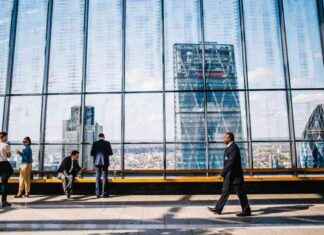Borneo is a unique natural paradise. The jungle of the Southeast Asian giant island is home to orangutans, Borneo pygmy elephants, proboscis monkeys, clouded leopards and hornbills. Like the Amazon region in South America, Borneo’s rainforests are considered the green lungs of the earth – and perhaps the last Garden of Eden on the planet.
But destructive forest fires and massive deforestation have been hitting the particularly species-rich island part of Kalimantan, which belongs to Indonesia, for decades. Now the region faces another challenge. Nusantara, the new capital of the island kingdom, is being built here.
Conservationists are already warning of new dangers because of the mega project. The Indonesian government is praising the future metropolis as a smart city that is both sustainable and innovative. An urban utopia in which green spaces and nature are paired with high-tech. Only electric vehicles should be allowed in Nusantara, and all energy should come from renewable sources.
Parliament approved the move last year. The main reason is that the previous capital Jakarta on Java is slowly sinking and between 20 and 40 percent of the city is already below sea level. By 2050, the entire North Jakarta area could be flooded. Added to this are traffic chaos and smog in the mega-metropolis with eleven million inhabitants (and even more than 32 million in the metropolitan region).
By 2045, around 1.9 million citizens are expected to live in Nusantara. That is ten times as many people as previously live in the area. The city in the province of East Kalimantan was pounded out of the forest on a proud area of ??256,000 hectares (Berlin for comparison: 89,200 hectares) – three quarters of which are to remain as forest areas.
Also in this green belt is Samboja Lestari, a sanctuary for orangutans and sun bears run by the animal welfare foundation BOS (Borneo Orangutan Survival). “The new capital will be built on former monoculture plantations. Primary forests have long since disappeared there, and the orangutan habitats are far away in the interior of the island,” said Daniel Merdes, Managing Director of BOS Germany.
At first there were concerns about the future of the orangutan station. But the organization is now working closely with the city planners to find the best possible solution for everyone involved — and to integrate the great ape rehabilitation center into the project. “In the best case, the high-profile location in the capital creates a stronger focus on preserving the island’s unique biodiversity, including new financing opportunities,” emphasized Merdes. BOS boss Jamartin Sihite also sees more potential than danger: “Around 75 percent of the area will be covered by forest and operated with green energy,” he told the German Press Agency. “And the core zone of the capital will be replanted with original species, not with monocultures as before.”
However, other environmental experts warn that East Kalimantan in particular has been exploited since the 1980s. Under the then dictator Suharto, who ruled until 1998, more than 160 forestry concessions were granted to businessmen in Penajam Paser Utara and Kutai Kartanegara – the very districts where Nusantara is being built, says Uli Artha Siagian. The forest activist works for Indonesia’s leading environmental group Walhi.
The result: massive deforestation of the unique forests, the settlement of mining companies and numerous palm oil plantations have severely damaged nature. “Environmental disasters are becoming more and more frequent in East Kalimantan,” emphasizes Siagian. Because forests have a protective function as a barrier for the runoff of excess water. If they are missing, catastrophes are inevitable. “Today, after just one hour of rain, floods and landslides are often unavoidable,” emphasized Siagian.
According to the National Agency for Development Planning, the population in the province of East Kalimantan will increase from the current 3.7 million people to more than eleven million. Greenpeace activist Ari Rompas is convinced that mass migration will put additional strain on natural resources in the entire region. “We think there will be further destruction of the remaining forest areas, including the mangrove forest in Balikpapan Bay.” Rompas fears a significant increase in the activities of resource-extracting companies. “This puts already endangered species under further threat.”
Borneo was also chosen as the location for a new capital because, according to President Joko Widodo, the risk of disasters such as floods, earthquakes, tsunamis and volcanic eruptions is significantly lower here. However, it is questionable whether the first authorities can be relocated as early as 2024 as originally planned – the construction work is still in the early stages.
Rawanda Wandy Tuturoong, a senior presidential adviser, pledged that Borneo’s forests would be protected. “The new state capital will be an intelligent forest city,” he said. “And that’s better than leaving this area undeveloped.”












